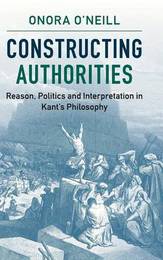
|
Constructing Authorities: Reason, Politics and Interpretation in Kant's Philosophy
Hardback
Main Details
| Title |
Constructing Authorities: Reason, Politics and Interpretation in Kant's Philosophy
|
| Authors and Contributors |
By (author) Onora O'Neill
|
| Physical Properties |
| Format:Hardback | | Pages:262 | | Dimensions(mm): Height 232,Width 154 |
|
| Category/Genre | Ethics and moral philosophy |
|---|
| ISBN/Barcode |
9781107116313
|
| Classifications | Dewey:170 |
|---|
| Audience | | Professional & Vocational | |
|---|
|
Publishing Details |
| Publisher |
Cambridge University Press
|
| Imprint |
Cambridge University Press
|
| Publication Date |
7 January 2016 |
| Publication Country |
United Kingdom
|
Description
This collection of essays brings together the central lines of thought in Onora O'Neill's work on Kant's philosophy, developed over many years. Challenging the claim that Kant's attempt to provide a critique of reason fails because it collapses into a dogmatic argument from authority, O'Neill shows why Kant held that we must construct, rather than assume, the authority of reason, and how this can be done by ensuring that anything we offer as reasons can be followed by others, including others with whom we disagree. She argues that this constructivist view of reasoning is the clue to Kant's claims about knowledge, ethics and politics, as well as to his distinctive accounts of autonomy, the social contract, cosmopolitan justice and scriptural interpretation. Her essays are a distinctive and illuminating commentary on Kant's fundamental philosophical strategy and its implications, and will be a vital resource for scholars of Kant, ethics and philosophy of law.
Author Biography
Onora O'Neill, Baroness O'Neill of Bengarve, is a former Principal of Newnham College, Cambridge, sits as a crossbench peer in the House of Lords and is Emeritus Honorary Professor of Philosophy at the University of Cambridge. She has published widely on Kant's philosophy and her most recent publications include Acting on Principle, 2nd edition (Cambridge, 2013).
|